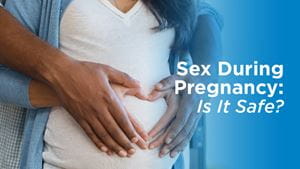
During pregnancy, many women and their partners question whether it’s safe to have sex. At what points during pregnancy is it safe to do so, and when should it be avoided?
Beth Toly-Hughes, CNM, advanced practice midwife at Unity OB/GYN at Brockport, answers the most common questions related to intimacy during and right after pregnancy.
In short, yes. It is safe for a woman to continue having sex throughout her pregnancy unless otherwise advised by her health care provider.
“Having sex will not hurt the baby, the baby is safe inside the uterus—protected by the muscles of the uterus and the amniotic fluid,” said Toly-Hughes.
However, pregnancy may cause changes in comfort and sexual desire and you may need to try new positions as your belly grows.
No, sexual intercourse with your partner during pregnancy will not cause a miscarriage. However, pregnant women should use protection if they are intimate with new or multiple partners. Sexually transmitted diseases or infections can lead to early labor, miscarriage, and other health complications.
Most miscarriages are caused because the fetus is not developing normally and not because of activities such as sexual intercourse.
Some women may have complications during pregnancy where it may not be safe to have sexual intercourse. However, intimacy with your partner can still be achieved by snuggling, kissing, and enjoying time together.
In some cases, your doctor or midwife may recommend you avoid having sex:
It can be normal to have mild cramping and light spotting with sexual intercourse. Nipple stimulation and/or orgasm can also cause cramping. If you experience any of the following symptoms, you should call your doctor or midwife right away:
“In some cases, women may have a complication that makes it unsafe for sexual intercourse. However, it is still important for many women to feel connected to their partner. If you’re having a difficult time, call your doctor to work through a solution."
While every woman is different, it is not uncommon for pregnant women to experience a higher sex drive, especially during the second trimester. A hormonal boost and increased blood flow to the genitals cause many women to feel higher libido.
However, fluctuating hormones, decreased energy, and physical discomfort may lead to a decrease in sex drive throughout pregnancy.
1st trimester: Changing hormone levels, fatigue, nausea, and breast tenderness can make you less interested in sex. Communicate how you are feeling with your partner and try to stay connected in other ways.
2nd trimester: Once most of the discomfort from the first trimester have resolved, you may feel more interested in sex. Increased blood flow to your genitals and uterus may make orgasm easier.
3rd trimester: Sexual positions may need to be modified to accommodate your growing belly. Try not to lie completely flat on your back. Breasts may leak with stimulation.
It’s normal for pregnant women to experience minor spotting after sexual intercourse. During pregnancy, the cervix is more sensitive and is easily irritated, which often leads to spotting after sex.
If spotting continues for multiple days or weeks, heavy bleeding occurs, or you experience sharp waves of pain while spotting, contact your health care provider immediately.
“If sex hurts or you experience bleeding, we recommend that you call your doctor,” said Toly-Hughes. “Sometimes you may have some spotting, which is generally okay, but you should still keep your doctor or midwife informed.”
Most doctors recommend waiting four to six weeks after childbirth to resume sexual activity, regardless of the delivery method. However, every woman is different and should talk to their health care provider for a recommendation that’s best for their health.
